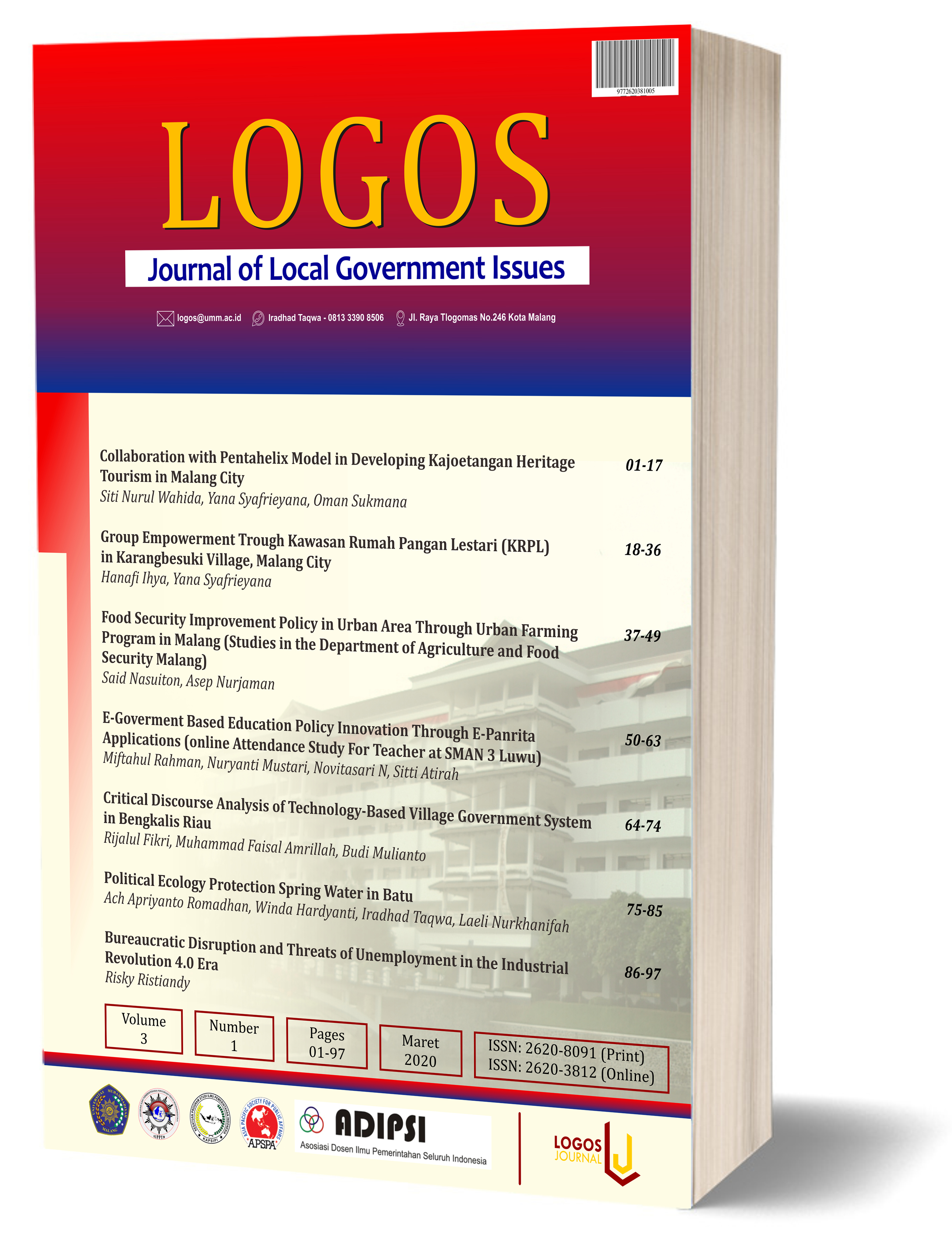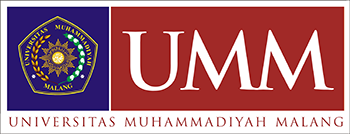E-Goverment Based Education Policy Innovation Through E-Panrita Applications (online Attendance Study For Teacher at SMAN 3 Luwu)
DOI:
https://doi.org/10.22219/logos.v3i1.10987Abstract
Innovation and policy in the public sector are two terms that complement each other. Every policy, in principle, must in principle contain new innovations. This study aims to determine the innovation of E-Governmment-based educational policies through the application of E-Panrita on online attendance for teachers at SMAN 3 Luwu. This type of research is a qualitative research with descriptive research type with data collection techniques direct observation to the study site, in-depth interviews and documentation. The results showed that the innovation of the E-Panrita application is seen in the product, where in the E-Panrita application product there is a change in teacher absenteeism which previously teachers absent with a manual system is now now with an online system to facilitate the Disdik in monitoring teachers every day and the pre-existing facilities have met but still need improvement. Now the teachers can do the absence simply by using their mobile phones or gadgets. Furthermore, the method, in the form of a strategy in the innovation of E-Panrita policies such as socialization in each region. The supporting and inhibiting factors of E-Panrita application education policy innovation in online absenteeism for teachers at SMAN 3 Luwu are supporting factors including resources, regulations, teacher commitment and technology. Inhibiting factors include the network and individual understanding of the teacher.
Keywords: Educational Policy, E-Government, E-Panrita
Downloads
References
Batalli, M. (2011). Impact of Public Administration Innovations on Enhancing The Citizens’ Expectations. International Journal of e-Education, e-Business, e-Management and e-Learning, 1(2).
Glor, E. D. (2007). Applying Innovative Processes to Improve Governance and Public Administration and Reduce Poverty. The Innovation Journal: The Public Sector Innovation Journal, 12(2), 1-11.
KASE, J. D. (2010). Perencanaan Strategis Sistem Informasi pada Pemkab Timor Tengah Selatan. Tesis: Universitas Gadjah Mada.
Muluk, K. (2008). Knowledge Management: Kunci Sukses Inovasi Pemerintah Daerah. Malang: Bayumedia Publishing.
Nugraha, J. T. (2018). E-Government dan pelayanan publik (Studi Tentang Elemen Sukses Pengembangan E-Government di Pemerintah Kabupaten Sleman). Jurnal Komunikasi dan Kajian Media, 2(1), 32-42.
Nugroho, T., & Riant. (2008). Kebijakan Pendidikan: Pengantar Untuk Memahami Kebijakan Pendidikan Sebagai Kebijakan Publik. Yogyakarta: Pustaka Pelajar.
Sururi, A. (2017). Inovasi Kebijakan dalam Perspektif Administrasi Publik Menuju Terwujudnya Good Public Policy Governance. Spirit Publik, 11(2), 14-30
Tyran, J.-R., & Sausgruber, R. (2003). The diffusion of policy innovations. An experimental investigation. An Experimental Investigation (May 2003). University of St. Gallen Department of Economics Discussion Paper(2003-14).
Law and Regulations
Gubernur Sulawesi Selatan, (2017), Peraturan Gubernur No. 154 Tahun 2017 Tentang Penyelenggaraan Pelayanan Pendidikan Berbasis Teknologi Informasi dan Komunikasi.
Presiden RI, (2003), Instruksi Presiden No. Tahun 2001 Tentang Telematika (Telekomunikasi, Media Dan Informatika), Jakarta.
Presiden RI, (2003), Instruksi Presiden No.3 Tahun 2003 Tentang Kebijakan Dan Strategi Nasional Pengembangan E-Goverment, Jakarta
Downloads
Published
How to Cite
Issue
Section
License
Copyright (c) 2020 Miftahul Rahman, Nuryanti Mustari, Novitasari N, Sitti Atirah

This work is licensed under a Creative Commons Attribution-ShareAlike 4.0 International License.
Authors who publish with this journal agree to the following terms:
- Authors retain copyright and grant the journal right of first publication with the work simultaneously licensed under a Creative Commons Attribution-ShareAlike 4.0 International License. that allows others to share the work with an acknowledgment of the work's authorship and initial publication in this journal.
- Authors are able to enter into separate, additional contractual arrangements for the non-exclusive distribution of the journal's published version of the work (e.g., post it to an institutional repository or publish it in a book), with an acknowledgment of its initial publication in this journal.
- Authors are permitted and encouraged to post their work online (e.g., in institutional repositories or on their website) prior to and during the submission process, as it can lead to productive exchanges, as well as earlier and greater citation of published work (See The Effect of Open Access).

This work is licensed under a Creative Commons Attribution-ShareAlike 4.0 International License.













